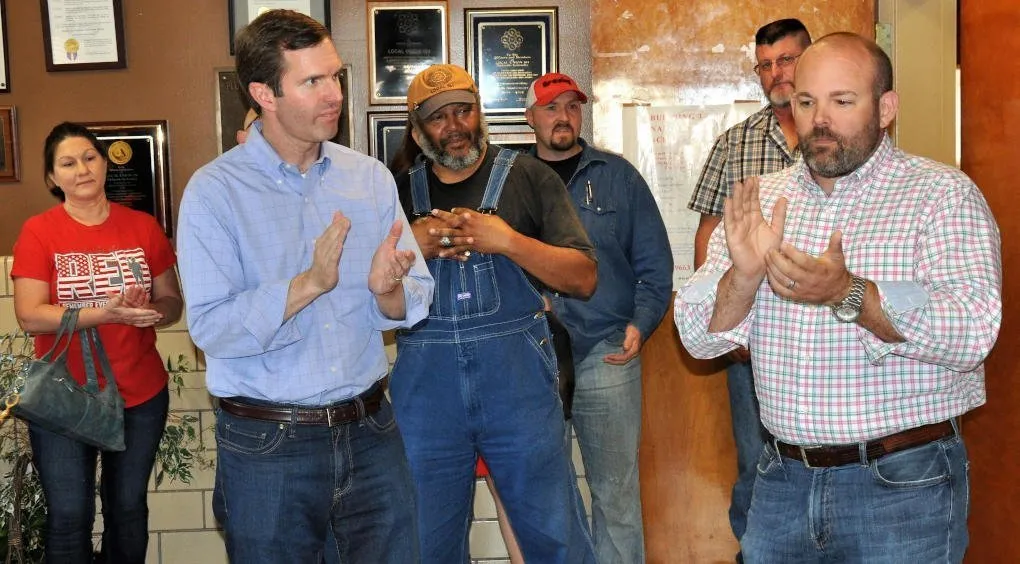The end of this year’s session of the General Assembly marks the start of next year’s race for governor.
Democratic Gov. Andy Beshear still has no strong Republican opponent, but he will, and the legislature helped write the campaign plan for whomever that will be.
Legislators overrode Beshear’s vetoes of measures that will be politically popular: a cut in the state income tax, from 5% to 4%, with a scheme to phase out the tax entirely if revenues allow; and a raft of bills that will help get social conservatives to the polls.
In a state where Republicans rule and once dismissed Beshear as a fluke, that sounds like a winning package – especially if former president Donald Trump is not discredited and campaigns for the GOP nominee.
But as the legislature gathered Wednesday to wrap up, Beshear held a ceremony in the Capitol nave that strengthened his political hand, announcing another gargantuan battery plant, this one to be built in Bowling Green.
Beshear clearly sees the state’s record economic-development gains as his key talking point for re-election, but in a tribalized era where voters are increasingly driven by ideology, an executive’s job performance means less than it once did. He says the battery plants will be transformative for Kentucky and it will no longer be a flyover state, and that could prove true, but voters won’t see the results until well after November 2023.
Beshear’s best hope on the economic front may be that rampant inflation, which will be poison for Democrats in federal elections this year, will have receded, and will not have been replaced by a recession. Pocketbook concerns will remain entangled with voters’ view of President Biden, who is having a hard time inspiring confidence in difficult circumstances.
Beshear has received good job ratings in polls, because most voters approved of his performance in even more difficult circumstances: a deadly virus for which there was no vaccine, and a pandemic in which Trump let governors largely fend for themselves. Voters’ pandemic fatigue will erode the credit Beshear gets for specific work on that front, but it gave him a lasting dose of name recognition and favorability unlike that of any modern Kentucky governor.
Beshear’s other main re-election pitch is likely to be education, always a major concern of voters, and legislators actually helped him with that point by passing, and overriding his veto of, a bill to fund two charter schools. The bill was the only major issue that divided the GOP; charters are not popular with rural Republicans because they can’t envision many such schools being created in rural areas, and they see them as a threat to funding of public education, rightly the closest thing to a sacred cow in rural Kentucky. That feeling is reinforced by teachers in the Kentucky Education Association, many of whom are Republicans. (KEA is Beshear’s main political base, which is probably why the legislature didn’t mandate raises for teachers like it did for other public employees.)
But there’s enough suspicion about liberal, progressive, activist teachers that the legislature passed a bill dictating how teachers should teach the history of racism. It avoided mentioning critical race theory, an academic concept that isn’t taught in Kentucky schools but has become a political touchstone for people who would rather forget about such history. We’ll hear that phrase again.
That bill, and one banning transgender girls and women from school athletics, are the latest examples of social-conservative measures designed to appeal to people who like simple answers to complex problems. (Immigration? Build a wall.)
Such bills were veto bait, and Republicans will use them to make Beshear look like a liberal. He’s been careful to avoid that; for example, his veto of the big anti-abortion bill focused on its lack of the very popular exceptions for rape or incest. In talking about the pandemic, he has talked often about his faith and family.
That sort of talk can win support, even from hard-nosed political players such as the major state vendor who attended the battery-plant ceremony and told me privately that he’s for Beshear partly because “He’s a family man” who has proven himself and is “better than anybody else they’ll put up,” speaking of the Republicans. Also, this big political donor said he likes Rocky Adkins, the Beshear adviser and former primary foe who appeals to more conservative Democrats and is his point man in dealing with legislative leaders.
Senate President Robert Stivers, House Speaker David Osborne, and other Republican legislators spoke at the ceremony; all but Stivers said nothing about Beshear (or even Economic Development Secretary Larry Hayes, whose work on this front goes back to Toyota). But in December 2023, they may have to attend a ceremony in which he gives his second inaugural address. The trump card may be Trump.
--30--
Cross-posted from the Northern KY Tribune.








